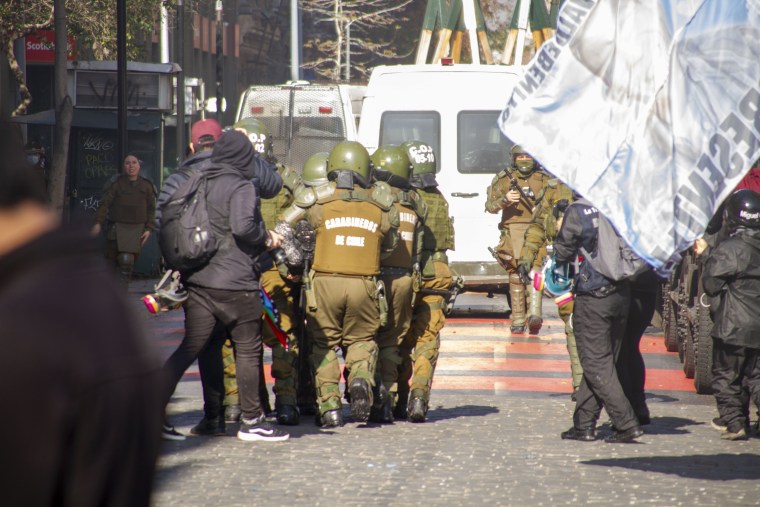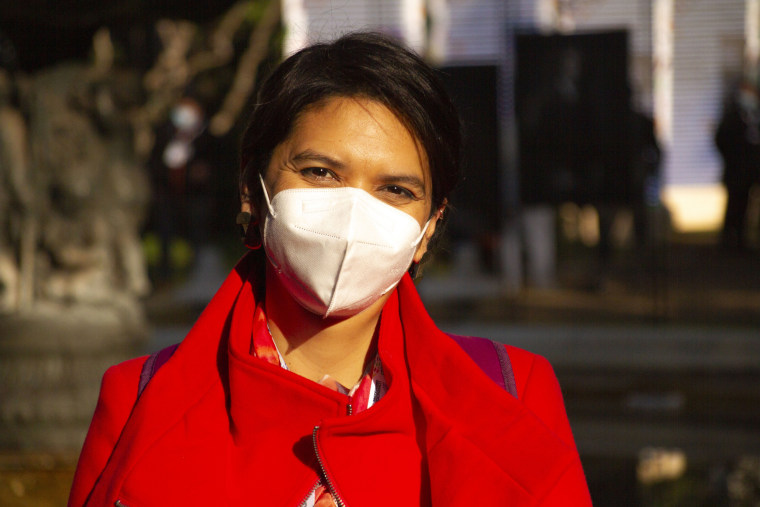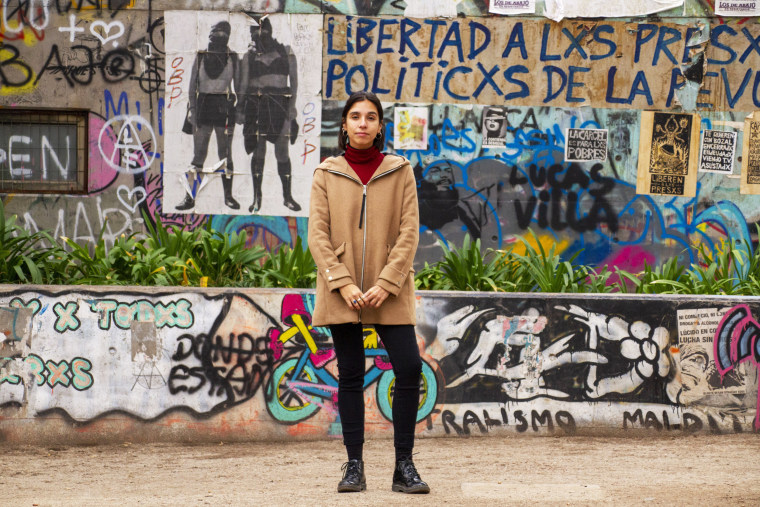SANTIAGO, Chile — Seated alongside 154 elected members of Chile’s new constitutional assembly, young feminist Giovanna Roa, 34, and many other female delegates wore purple and green neckerchiefs bearing the slogan "Nunca más sin nosotras," meaning "Never again without us."
The words are linked to the fight for women’s rights, which has been intensifying in recent years in Chile and is achieving milestones in the wake of the protests that rocked the country in 2019.
Last Sunday, Roa attended the constitutional assembly’s first convention to begin creating the world’s first constitution to be drafted by an equal number of women and men. The historic moment is a direct result of the 2019 protests that challenged inequality in one of Latin America’s most socially conservative countries.
"I’m the first politician in my family," Roa told NBC News. "I feel like I am an outsider, but I wanted to run because the protests made me realize that things were going to be different. Our institutions, which have ignored social demands for years, finally must listen to us."
When Roa was born in 1986, Chile was close to a return to democracy following nearly two decades of Augusto Pinochet’s brutal military dictatorship, which resulted in the execution or disappearance of over 3,000 people. During the same period, the state of women's legal rights fell behind most of Latin America. Though Chile boasts one of the region’s strongest economies, women's rights have remained stunted.
The current 1980 constitution, written by a commission that was hand-picked by proponents of the dictatorship, has remained in place for Roa’s entire life — even after Chile’s 1990 return to democracy. Steely and impassioned, she can now play a part in replacing it.
Though Roa may feel out of place in the assembly, her membership in the body of 77 women and 78 men is emblematic of its makeup and the participatory spirit of the movement that started during the estallido (surge), as the protests are known, which in turn led to a referendum for a new magna carta, after the current one became a focus of the protests.
The results of the May elections for the assembly saw unprecedented outcomes, with delegates from the traditional ruling elite swept aside by political independents. Young progressives, Indigenous people and scientists campaigned successfully on diverse issues including gender, access to natural resources and environmental protection. The right-wing coalition backed by President Sebastián Piñera won just 37 seats, below the one-third it needs to block any radical changes.

Despite its return to democracy in 1990, Chile has remained a highly patriarchal country, and the Catholic Church wields strong influence in policymaking. It took 27 years after the end of the dictatorship for abortion to be decriminalized, and it's only legal if it's the result of rape, if the fetus won't survive or if there's a threat to the mother’s life.
Critics say the 1980 constitution has remained a barrier to true democracy and the Pinochet regime’s discouragement of female participation in the workforce and public life have continued to affect women and their social roles.
In 2018, a year after the #MeToo movement erupted in the U.S., Chile witnessed massive feminist protests started by students challenging sexual abuse and discrimination. The momentum flowed into the 2019 protests challenging inequality.
“Women were invisibilized by the dictatorship,” said Roa, who regularly joined the 2019 and 2020 protests at the epicenter, Plaza Dignidad (Dignity Square), in her neighborhood. “The parity rule is an example that we have a chance to do something truly different. We want to create a different relation between the state and society. There has been a disconnect in Chile for too long.”
What assembly members like Roa aim to do is very different from the country's current political system. René Rojas, an assistant professor in the department of human development at Binghamton University in New York, said the electoral system in Chile since 1990 created conditions whereby power was shared by the dominant center-left and center-right parties, which were almost guaranteed to win their seats.
"The free market neoliberal model enshrined in the 1980 constitution also meant that big business has dominated the agenda of the parties in control," Rojas said. "There has been little need for meaningfully responding to the electorate's interests."
Sunday’s historic first gathering was delayed for two hours by protests outside and inside the former congressional building, as delegates deliberately disrupted the ceremony, calling for political prisoners to be freed. The 2019 protests saw thousands arrested, and some have languished in jail for over a year without conviction. The state security law that was regularly used to arrest protesters raises the seriousness of minor crimes to allow for longer pretrial detentions, which are common in Chile.

"There is a lot of confusion because it hasn’t been possible to get reliable numbers on how many protesters from 2019 are still imprisoned and awaiting due process," human rights attorney Catalina Fernández Carter said.
A bill was submitted to Congress in May calling for the pardon of 800 protesters on pretrial detention, while the judiciary responded there were only 25 prisoners.
Hope for Indigenous political power, focus on climate change
While "Nunca más sin nosotras" is a banner for women’s rights, the assembly symbolizes a potentially new era of participation in Chile.
Mapuche, Aymara and other Indigenous flags from Chile’s native people, who make up 9 percent of Chile’s population of 19 million, were being waved during the protests, and Indigenous groups were eventually guaranteed 17 reserved seats in the assembly.
In its first act, which will be seen as another historic moment for the country, the assembly voted for Elisa Loncón, a Mapuche academic, as its president.
The current constitution does not recognize Chile’s Indigenous groups, treating everyone as "Chilean." During her acceptance speech, Loncón said, “It is a dream, it is part of what our ancestors have always fought for, to achieve spaces of equality and dialogue on equal terms.”
Just 30 percent of academic scientists in Chile are female. Microbiologist and environmentalist Cristina Dorador, 41, of the University of Antofagasta, is now part of the political process after winning the highest number of votes in her district. Four scientists were elected to the assembly drafting the constitution, from nearly 20 on the ballot.

"I ran because Chile is one of the most affected countries in the world for climate change, and I really do not think we are doing enough," Dorador said.
"We have a lot of problems with water, which is privately owned and leaves many communities shipping water in by bottles, because the supply is dictated by economical factors. We will lose more water by climate change," she said. "We need to change how we are doing things."
'We will win when the new constitution is accepted'
The assembly will have a maximum of 12 months to write the new constitution to be approved by a second referendum in 2022. If it is rejected, the Pinochet-era document will remain in place.
“We will win when the new constitution is accepted,” Roa said. “This is the end of a dark era that is still alive, because the concentration of economic and political power is still there, as it was written during the dictatorship. ... Now we have the chance to be an experiment of a new kind of democracy.”
